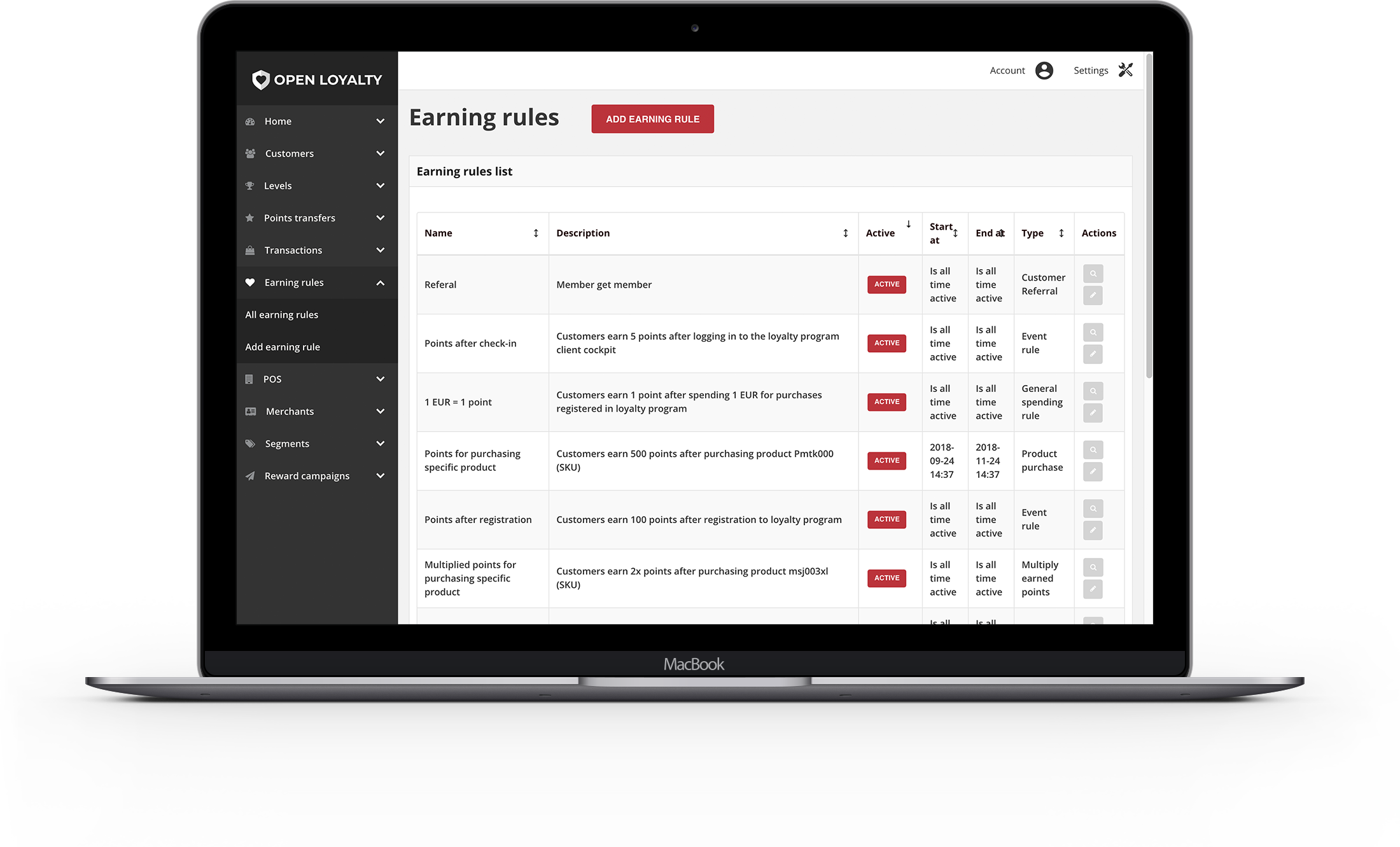Open Loyalty is a headless loyalty technology for visionaries and innovators who want to implement an effective loyalty program that cuts across multiple touchpoints. Our solution is 100% API-first and unlike old-fashioned, monolithic software, it’s easy to integrate with and ensures complete flexibility, speed, and effectiveness at all levels.
Book a live demo here www.openloyalty.io
Open Loyalty is available in two editions - Hosted, and Dedicated. Here you can find Open Source Edition (v.3.2). It is limited to non-commercial projects, does not provide guaranteed performance and scalability and therefore, it is recommended for testing purposes only. It is also significantly different from the current commercial editions of Open Loyalty.
We strongly advise using Hosted or Dedicated in commercial projects.
Hosted or Dedicated editions are not available publicly on GitHub. To get the quotation, please visit www.openloyalty.io and send the request.
| Hosted | Dedicated | |
|---|---|---|
| All loyalty & gamification features | Yes | Yes |
| Robust & efficient API | Yes | Yes |
| Members limit | Unlimited | Unlimited |
| Hosting | Cloud | Self-hosted |
| High performance & scalability | Yes | Yes |
| Maintenance & support | Yes | Yes |
| Whitelabel | Yes | Yes |
There are a variety of ways Open Loyalty can be used to provide headless loyalty architecture. Based on it, you can build loyalty solutions like:
- full loyalty programs for off-line and on-line channels
- mobile loyalty applications
- motivational programs for employees
- loyalty modules for your own product
High performance and scalability are available in Hosted and Dedicated editions only. In this case study you can read more about how Open Loyalty reached over 1500 concurrent API calls with a response time under 1 second and Easy scalability with Kubernetes and AWS infrastructure.
This project has full support for running in Docker.
Go to the docker directory:
cd docker
Execute the below command to run the application:
docker-compose up
After that, execute the below command to initiate and set up the database:
docker-compose exec --user=www-data php phing setup
Before you start using Open Loyalty, you need to define hosts in your local environment. Add host openloyalty.localhost as 127.0.0.1 in your system configuration file (/etc/hosts). If you find any problems using docker (for example, in Windows environments), please try our Vagrant recipe.
You should have Vagrant and Virtualbox installed before executing this recipe.
Then, please execute the following commands:
vagrant up
vagrant ssh
docker-compose -f docker/docker-compose.yml up -d
docker-compose -f docker/docker-compose.yml exec --user=www-data php phing setup
That's all. Now you can go to the admin panel openloyalty.localhost:8182. Default login is admin and password open. You can also go to customer panel openloyalty.localhost:8183.
vagrant provision --provision-with syncsync current dirvagrant provision --provision-with buildrebuild docker base images
After starting Open Loyalty, it exposes services under the following URLs:
- http://openloyalty.localhost:8182 - the administration panel,
- http://openloyalty.localhost:8183 - the customer panel,
- http://openloyalty.localhost:8184 - the merchant panel,
- http://openloyalty.localhost - RESTful API port
- http://openloyalty.localhost/doc - swagger-like API doc
If you are a developer and want to attach source code, then you have to build base docker images:
./docker/base/build_dev.sh
and run containers:
docker-compose -f docker/docker-compose.dev.yml up
Remember to setup database using bellow command:
docker-compose -f docker/docker-compose.dev.yml exec --user=www-data php phing setup
After starting Open Loyalty in developer mode, it exposes services under slightly different URLs:
- http://openloyalty.localhost:8081/admin - the administration panel,
- http://openloyalty.localhost:8081/client - the customer panel,
- http://openloyalty.localhost:8081/pos - the merchant panel,
- http://openloyalty.localhost - RESTful API port
- http://openloyalty.localhost/app_dev.php/doc - swagger-like API doc
Running phing setup will generate the JWT public/private keys for you, but in case you would like to generate them "manually" use phing generate-jwt-keys.
Technical documentation is located here.
If you wish to contribute to Open Loyalty, please read the CONTRIBUTING.md file.
